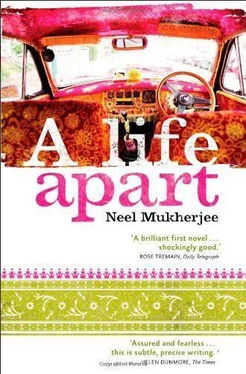Yours sorrowfully, James.
P.S.: I am attaching a photograph of Richard and me in Maine two autumns ago. Richard wished you to have it one day.
There is no photograph. Ritwik upends the whole box, shakes out everything on to the floor, goes through every fold and sleeve of paper, but he cannot find it. He feels so hollow and shaky inside that he holds on to the edge of the table before slumping on to the bed. He watches, unmoving, the night lightening to a grey dawn outside his window. He doesn’t turn off his bedside lamp.
Next morning he discovers that the tiles on the side of the bath have come loose. As he kneels down to examine the damage more closely to see if he can manage a temporary repair, they fall onto the floor, exposing the dark cavern under the bath and half a dozen bottles of Safeway gin nestling in there. He debates whether to confront Anne with this or simply hide them away silently somewhere out of her reach and decides on the latter; she is so brilliant at evading, stonewalling and plain not listening that the first approach would get him nowhere. What baffles him most is how she has been smuggling it in. Mrs Haq? No, she would never do such a thing. Mr Haq? Equally unlikely. Did Anne herself go out of the house to get it? Impossible. The nearest Safeway is in Balham and Anne doesn’t have a car.
He gives up in despair; he can forgive her anything. He paces the garden for a while with his hands on his hips. As he slips his hands into his back pockets, he comes across a folded piece of paper. He takes it out and opens it. On it, in green ink, are an 081 London phone number and the name of Zafar’s contact. He cannot believe the name written on it in Zafar’s hand so, to have his fears confirmed, he rushes in immediately and calls the number. No one picks up the phone and there is no machine. He tries every twenty minutes, nervous, impatient, puzzled. Seven hours later, at around five in the afternoon, the phone is answered. The voice and accent are unmistakable: they are Saeed Latif’s.
Fires have started in the village of Nawabgunj. Little armies of saffron-clad youths, some of them hardly out of their teens, are rushing around the village like the lawless winds, seizing foreign goods wherever they are stocked — cloth from Manchester, salt from Liverpool, stainless steel implements and utensils from Sheffield, sugar from Leicester — dragging them out into the open, pouring kerosene over them and torching them into bonfires. Their zeal is incandescent, the air above the conflagrations redolent with the ardour of their mother goddess mantra, bande mataram . No door can remain shut to them, no English goods, however tiny, hidden from their righteous rage. The handful of Muslim traders who have resisted have had their houses set on fire too. Some of them have fled the village, others have voluntarily surrendered their secret stockpiles of tainted English goods to avoid greater dangers.
Miss Gilby has seen for herself the heaps of black ash left in the market square, the aftermath of some burning ceremony. On one occasion, she had even seen the dying embers in one; a little child had picked up stones from nearby and flung them on to the residue of the fire, sending up little flurries of black ash, like insects disturbed, in a shower of red sparks.
Gossip and rumours arrive at ‘Dighi Bari’ by the hour, spreading like bushfire, accompanied by whispered excitement that can barely be kept in check. Did you know they have set Faizal Mohsen’s warehouse on fire? He was hiding a whole consignment of foreign cloth, planning to pass it off as swadeshi fabric in the market. Unable to go out, the women in the andarmahal gather news from the servants and embellish it with untrammelled freedom. Bimala’s naw jaa has already started packing her boxes and trunks in preparation for moving to Calcutta. Miss Gilby is no longer certain how much of that possible move has been actually discussed in the family and how much of it is in her fervid imagination. But the sight of those fires made Miss Gilby realize that not all was rumour and fabrication.
Mr Roy Chowdhury holds long, agonized meetings with the elders of the village. He is advised to send his friend, Mr Banerjea, packing. The village grows mutinous against the depredations of these imported youths. The elders advise Mr Roy Chowdhury to placate the Muslim population of the village who are now convinced that it is a Hindu plot to drive them out; they are not going to keep quiet for long and watch these thugs set their lives and living on fire.
All this Miss Gilby finds out when she accidentally crosses Mr Roy Chowdhury’s path in the morning while he is on his way out and she on her way to the drawing room for the first of the morning lessons. In a hurried exchange of words in the verandah, marked by great anxiety and foreboding, he warns her of the dangers of going riding unaccompanied at such a volatile time: anti-English sentiments are running high and unchecked and she would do well to be extra cautious. She thanks him for his solicitude; more than that she cannot say because she is robbed of her usual amiability by the haunted and gaunt look that has settled like a mantle of darkness on him.
Then one day the fires outside come inside. On the day the local bank is robbed — it remains in no doubt that swadeshi youths have done this for even revolutions need money; besides, the young men who committed the deed didn’t bother to mask themselves — that same evening, Robin babu , Mr Roy Chowdhury’s accountant, is set on by a mob of rabid men and beaten so severely that had Rakhal Sardar not passed by fortuitously, on his way to fetch water from the well, and heard his piteous groans, the accountant would have bled to his death in the muddy ditch into which he had been pushed. When Robin babu comes to his senses and manages to speak, he cannot say with any certainty who the assailants were. Mr Roy Chowdhury calls his own doctor to look after the poor man. The ramifications of the attack on his innocent accountant have disturbed him no end: were the perpetrators swadeshi youths trying to pass it off as a heinous act committed by the wily and intransigent Muslims, thereby attempting to alienate any sympathy for them, or was it really Muslim anger boiling over and this cowardly deed its first expression? As zamindar of Nawabgunj, any action taken by him without establishing the incontrovertible truth could have serious repercussions.
Bimala stops attending lessons altogether. Miss Gilby doesn’t write to Mr Roy Chowdhury again: the man is too burdened with graver matters to have the leisure to discuss his wilful and secretive wife’s little obstinacies with her tutor. She waits for this sudden rain of madness to let up but deep down inside something tells her that she is not for long in the Roy Chowdhury family. Something, some connection, thin as a strand from a spider’s web, has been severed and there is no repairing it. The music has become subtly discordant.
Saeed patters his stubby fingers on the faux-chrome top of the table to an invisible tune inside his head. It goes maniacally fast sometimes; at other times it reduces to the slow tapping of his index finger once every few seconds. Indeed, there is something manic about Saeed this morning; he has made the journey from Ganymede Road to Al-Shami, his favourite restaurant on Edgware Road, in fourteen minutes flat, zipping through the empty stretches and jumping most of the traffic lights on the way. He had kept drumming his fingers on his steering wheel, had fiddled with his rings and bracelets, and had spewed out an unstoppable stream of words at Ritwik during that quarter of an hour. The only noteworthy thing Ritwik managed to extricate from it was the fact that Saeed kept calling Zafar ‘Sheikh bin Hashm’ and, when asked by Ritwik if he was really a sheikh, he had replied, ‘Yes, sheikh, sheikh, important person, VIP, very rich, lots money’, with an accompanying gesture of rubbing the tips of his forefinger and thumb to emphasize the undeniable fact of Zafar’s immense wealth. All this left Ritwik confused about whether Zafar was really a sheikh; Saeed could have been using the term loosely, in the way Italians call everyone ‘dottore’, regardless of their profession or level of higher education.
Читать дальше












